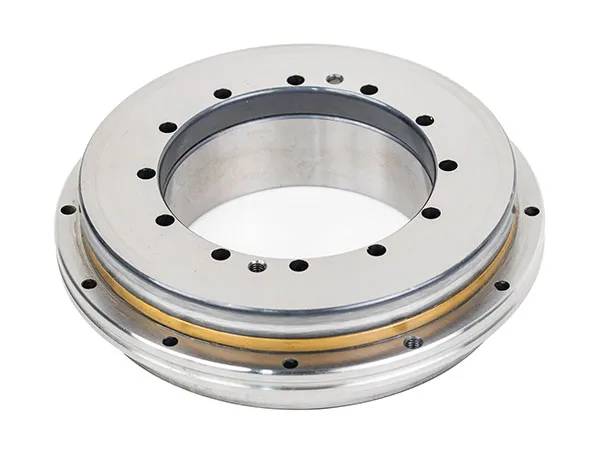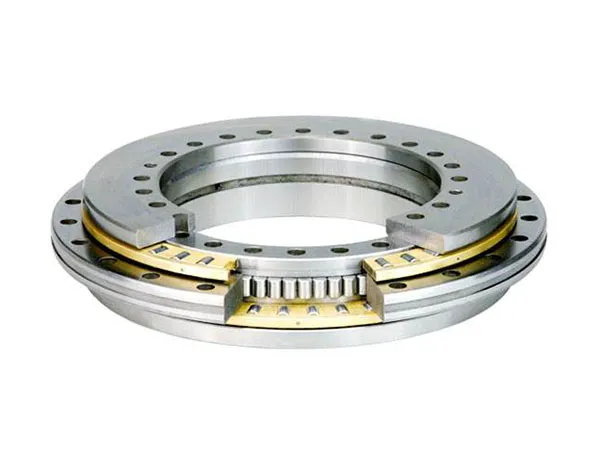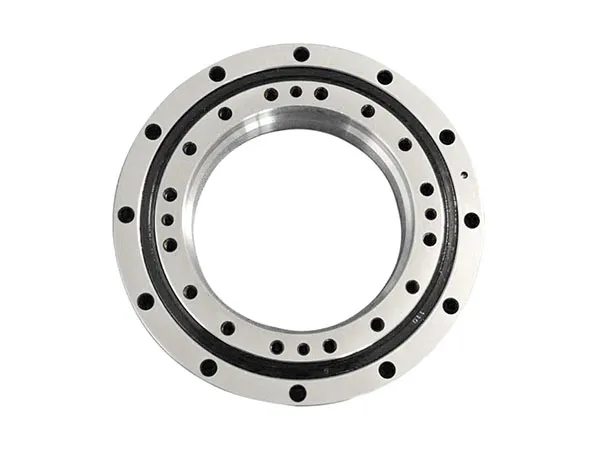- +86 13837949030 +86 15890619536
- info@lymcbearings.com export@lymcbearings.com
- Luoxin Industrial Cluster, Luoyang City,Henan Province,China
Time:2025-11-24 02:08:34 Source:LYMC Slewing Bearing
In today’s rapidly evolving industrial landscape, standard solutions often fall short when machinery faces unique operational demands. Custom rotary table bearings have emerged as a critical solution, providing tailored performance, enhanced reliability, and extended equipment lifespan. Whether for heavy machinery, automation systems, renewable energy equipment, or precision robotics, these bearings are engineered to meet exact specifications, ensuring optimal efficiency and operational excellence.

1. Engineered for Specific Operational Requirements
Unlike generic bearings, custom rotary table bearings are designed with your exact operational needs in mind. Factors such as load capacity, rotational speed, environmental conditions, and spatial limitations are carefully considered during the design process. This allows manufacturers to create bearings capable of handling high axial loads, heavy radial stress, or demanding torque requirements, ensuring maximum performance and safety.
For instance, in heavy-duty manufacturing or steel production, off-the-shelf bearings may fail under extreme pressures, leading to costly downtime. Custom bearings, by contrast, can be tailored to sustain these high-load conditions over extended periods.
2. Enhanced Durability and Reliability
Industrial machinery often operates in harsh environments, including extreme temperatures, dust, moisture, vibration, or corrosive conditions. Custom rotary table bearings can be manufactured using specialized materials, coatings, and heat treatments, ensuring long-term durability and reliability.
By reducing wear and tear, these bearings minimize downtime and maintenance costs. In applications such as mining equipment, construction machinery, or aerospace systems, reliability is critical, and custom bearings provide a dependable solution that standard bearings cannot match.
3. Precision and Efficiency
Precision is essential for applications such as CNC machining centers, robotic arms, wind turbines, and solar tracking systems. Custom rotary table bearings offer:
Exact tolerances for smooth rotation
Minimal backlash to maintain alignment and reduce vibration
Optimized rotational efficiency to enhance energy savings
These features directly translate into higher productivity, improved product quality, and more efficient operations. For example, in automated assembly lines, precision bearings ensure that robotic arms operate smoothly, reducing errors and improving throughput.
4. Versatility Across Industries
Custom rotary table bearings are widely used across multiple sectors, offering solutions for both heavy-duty operations and high-precision applications:
Heavy Machinery: Construction, mining, steel mills, and industrial presses.
Automation & Robotics: CNC machines, robotic arms, and automated assembly systems.
Renewable Energy: Wind turbines, solar trackers, and hydroelectric equipment.
Transportation & Defense: Aerospace components, defense vehicles, and precision military equipment.
By tailoring bearings to the specific requirements of each industry, manufacturers can ensure smooth operation, reduced wear, and longer service life for all types of machinery.

Choosing the right custom rotary table bearing involves more than just size and load capacity. Key factors include:
Load type and magnitude: Axial, radial, or combined loads
Operating speed and rotation frequency
Temperature range and lubrication method
Environmental factors: Dust, moisture, vibration, or corrosive exposure
Material and surface treatment: Steel, ceramic, or composite options
Partnering with an experienced bearing manufacturer ensures that all these factors are considered. This results in bearings optimized for long-term performance, minimal maintenance, and enhanced operational efficiency.

1. Reduced Maintenance Costs
Custom bearings are designed to handle the exact conditions of your equipment, reducing wear and prolonging service life. This translates into lower maintenance costs, fewer unscheduled downtimes, and higher overall equipment availability.
2. Improved Productivity
With smoother rotation and precision engineering, machinery equipped with custom bearings operates more efficiently. This leads to faster production cycles, fewer errors, and higher output quality, whether in a steel mill, wind farm, or automated assembly line.
3. Operational Safety and Reliability
By choosing bearings tailored to specific loads and conditions, companies can reduce the risk of equipment failure, ensuring the safety of both machinery and personnel.
4. Long-Term Return on Investment
Though custom bearings may require higher initial investment than standard models, the extended lifespan, improved efficiency, and reduced downtime provide significant long-term cost savings.
As industries increasingly demand automation, precision, and renewable energy solutions, the role of custom rotary table bearings continues to grow. Manufacturers are now focusing on:
Advanced materials: Ceramics and composites for extreme conditions
Smart bearings: Integrated sensors for real-time monitoring of load, temperature, and wear
Sustainable designs: Bearings that require less lubrication and reduce environmental impact
These innovations further enhance the value of custom bearings in improving industrial productivity and operational reliability.
In today’s industrial world, precision, reliability, and durability are no longer optional—they are essential. Custom rotary table bearings provide a tailored solution that ensures smooth operations, extended machinery life, and reduced maintenance costs.
For companies seeking to optimize performance across heavy machinery, robotics, renewable energy, and aerospace applications, investing in custom rotary table bearings is a strategic decision. By partnering with experienced manufacturers, businesses can achieve higher efficiency, better product quality, and long-term operational success.